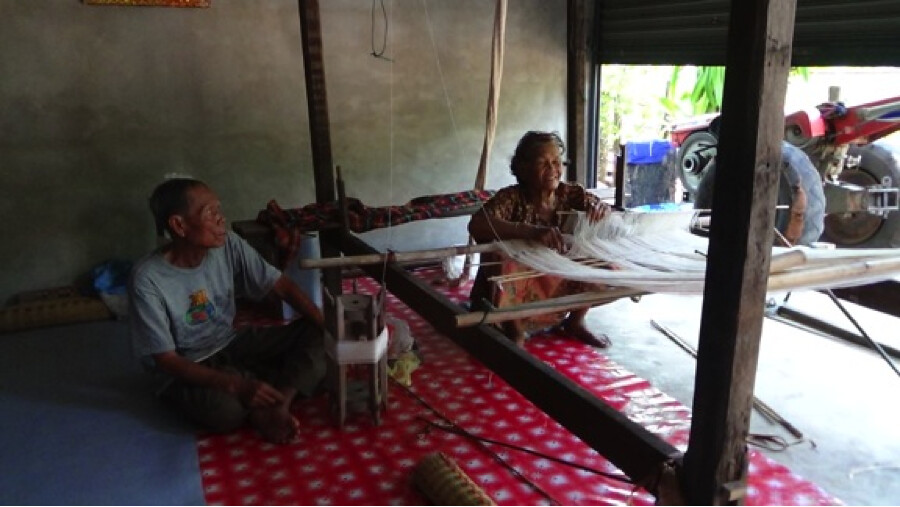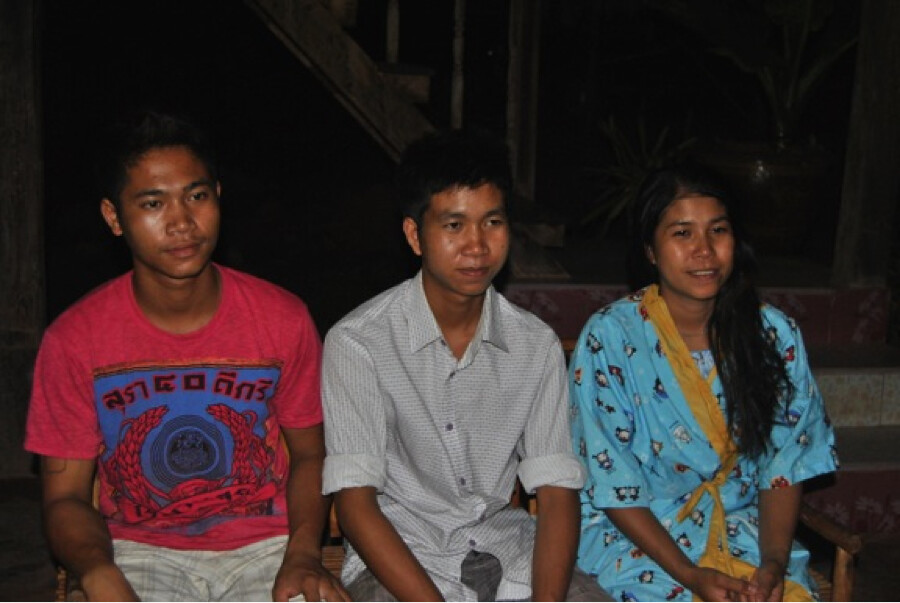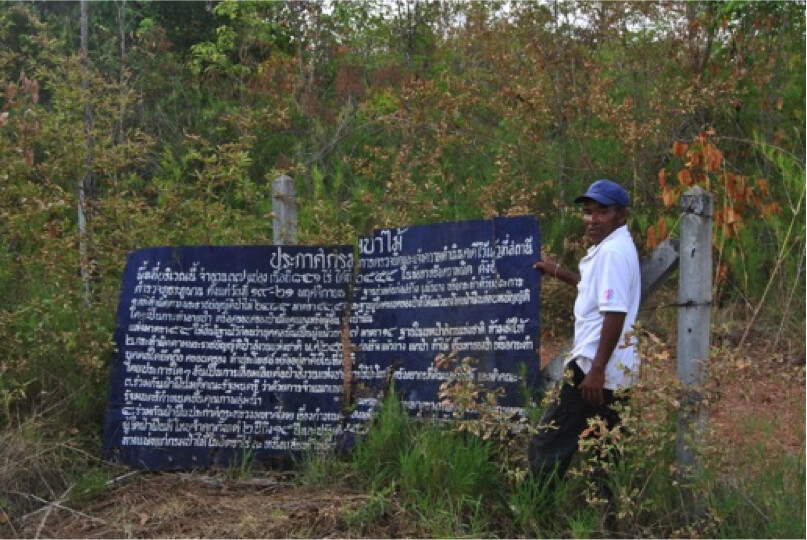Eight months after the implementation of the Thai government’s Master Plan to reforest the country, villagers in Isaan bear the burden of a flawed policy at the cost of their livelihood and health.
KALASIN – Three thousand rubber trees lie fallen on top of each other as if nothing more than a row of toppled dominoes. A slender man with calloused hands and laugh lines around his eyes gazes at the field that was once his life savings, primary source of income, and home. It is now covered in weeds, destroyed in the name of environmental conservation and reforestation.
Paiwan Taebamrung, 46-years-old, recounts the circumstances under which it all happened. A district officer came fully armed to his house at night demanding Paiwan leave his property. The smell of whiskey was in the air. Three days later, the officer returned with the village headman. Paiwan watched as dozens of officers cut down 30 out of 36 rai of his rubber trees.

The Master Plan, rolled out by the National Council for Peace and Order (NCPO) shortly after the coup last year, purports to target commercial investors who own and exploit thousands of rai to grow rubber, cassava, and other cash crops.
Villagers claim they are not at all investors – only poor families trying to make a living on land they have worked their whole lives.
“Many impoverished villagers who have lived in the forest for decades have been identified as investors,” explains Dr. Nattakant Akarapongpisak, a lecturer in the Faculty of Politics and Government at Maha Sarakham University.
This was the case with Paiwan. “They labeled me an investor and told me I had to move out. My family has been working on this land for 47 years.” Paiwan’s house was deemed an illegal structure, and he and his wife have had to move in with his elder sister.
Now, eight months after his eviction, the repercussions of the Master Plan are as strong as ever. Paiwan and his wife have had to find work as day laborers making the minimum wage of 300 baht per day.
“It is hard to make ends meet,” he says, “and I feel frustrated I am not working my own land. I worked in the South for 20 years to save up enough money to buy the rubber trees.”
According to the Internal Security Operations Command, farmers in 68 provinces are facing similar charges and evictions. What began as an admirable goal of achieving forest cover in Thailand within 10 years has now turned into a laundry list of human rights violations.
The International Covenant of Economic, Social, and Cultural Rights (ICESCR) clearly outlines the right to work, and protects people from deprivation of their means of subsistence. Barring access to land directly contradicts the principles the Thai state has sworn to uphold.

“Right now I work as a laborer, tapping the rubber for someone else in this village because they seized my farmland. I cannot work there anymore.”
With his land seized, Pongsamai Silawan, a resident of Kalasin province, lost his primary means of income. He soon discovered that his meager salary as a day laborer was not enough to support his family.
“I have to sneak onto my land to tap for rubber,” the 52-year-old Pongsamai says. He recounts the events of a day following his secret tapping. As he was cooking rice, he heard the dogs barking. “I dropped everything. The officers were coming,” he says. “When the dogs bark, I am ready to run.”
If caught, Pongsamai could face up to four years in prison.
Pongsamai faces a dilemma. “Between being afraid and having no food, which would you choose?” he asks. He has had to cut back on many expenses. “I can’t afford food from the market. I must scavenge for it in the forest. I don’t have money for my motorcycle, and I am even in debt to the gas station.”
In the nearby village of Jatrabiab, in Sakon Nakhon Province, the government has taken a more direct approach. Labeled as “investors,” 34 villagers have been charged with trespassing and encroachment.
Charges have piled up in some families. The Srikham family had three members charged for encroachment. Khamlamun Srikham was called in to the Royal Forestry Department (RFD) under the pretext of registering her land in order to receive land titles.
She had wanted to divide the land she farmed into three parts – one for herself, and two parts for her daughters who could have land titles in their own names as an inheritance.
Yet soon after, Khamlamun and her two daughters were all charged for trespassing. The key piece of evidence behind the charges was the very information Khamlamun had provided to the RFD.
“We trusted [the RFD representative] as a government employee, that he would allocate the land to us,” Chai Thongdeenok explains. “But the RFD truly tricked us villagers. Now we have no rights and cannot use the land.”
Khamlamun’s eldest daughter was charged even though she’s been working in Bangkok for over 20 years. She now has to cover transportation costs to and from Bangkok to attend court hearings.
For Amorn, Khamlamun’s younger daughter, what hurts the most is the effect the charges have had on her father. “He used to talk and laugh. But since the court case he is quiet and doesn’t say much,” she says. “I believe everyone who’s been charged is suffering from depression.”

As her husband looks on, Khamlamun Srikham passes the time weaving, no longer able to engage in farming.
Charges have been often exaggerated, say many of those arrested, adding even more pressure on these fragile families. When Khamphai Todkaew was brought to court, she found that she had been charged with farming 36 rai of land, when she only owned four rai.
These discrepancies in charges are not anomalies – of the 34 people charged, 25 reported being charged with incorrect property amounts.
Khamphai’s husband, Prasert, offered to be charged in her place, and thought he had reached an agreement with the police to such effect. Yet when the case was brought before the judge, the court charged both husband and wife.
They were presented with two choices: either fight but risk four years in prison if found guilty, or give up and suffer a reduced penalty of two years. In the absence of adequate legal advice, they opted not to fight the charge and instead plead guilty.
The arrests of both the mother and father have shaken the entire family. The eldest son, Lerdsak, 23 years old, has fallen apart emotionally. After 10 days in a psychiatric ward, he has returned home but is still at risk. “Every day now my brother has to take psychiatric medicines to manage his condition,” says his brother, Jakkrit. “He cannot work and we must spend a lot of time taking care of him.”
At least three families have had a family member see a doctor or have been admitted to the hospital for psychiatric illnesses. This not only puts an added strain on state mental health facilities, but burdens families with medical payments and extra care of loved ones.

Jakkrit, 21, Lerdsak, 23, and Tannika Todkaew, 26. “It is like we have lost the main pillars of our family, leaving just us three.”
Despite negotiations with representatives of the RFD, farmers in Jatrabiab were denied access to their land during the legal proceedings. A survey of families shows that 75% of those charged are barring access to their primary source of income, resulting in an average loss of monthly income of 50-80 percent per capita.
The absence of a steady primary income source, court fees, and agricultural loans have resulted in insurmountable debt. Collectively, the charged villagers owe around 4.2 million baht, or 180,000 baht per person on average.
Even under the best circumstances, it would take a farmer almost a decade to pay off this debt even without interest. When external factors such as available workdays, health and family expenses, and unexpected expenditures are taken into account, it is unlikely that families can ever repay it.
Land evictions of this type in Thailand have rarely met positive outcomes. The prospects of compensation from the state are low, says Nattakant, drawing comparisons with the Khor Jor Korprogram in 1992. According to Dr. Nattakant, under the 1992 program, government officials stated that there would be just and appropriate compensation measures. However, the funding never came and the land the government allocated was already occupied.
Today, military rule exacerbates the situation, argues Nattakant. “Officials have blocked villagers any access to help from their allies, including media, NGOs, activists, and academics. Some of the villagers have been received death threats if they tell the media about their plight.”
The military makes it nearly impossible for villagers to share their concerns with larger society. “The use of martial law or Section 44 of the interim constitution and the repeated summoning processes,” says Nattakant, “clearly violate the rights of local people to resist, or even question the implementation of the plan.”
Despite international condemnation and statements issued by the United Nations Office of the High Commission for Human Rights (OHCHR), the NCPO has failed to protect the rights of the poor. As of last November, over 500 forest encroachers had been prosecuted and 300,000 rai of land had been seized.
Under the NCPO’s approach, many more will suffer like Pongsamai and the Todkaew children, as they are pushed off their land and further into the margins of Thai society.

The eviction notice placed by the NCPO in Sakon Nakhon village.
About the author: Sarah Sanbar studies International Relations at Claremont McKenna College. She is a student-journalist on the CIEE Khon Kaen study abroad program.
The article is first publish on The Isaan Record

